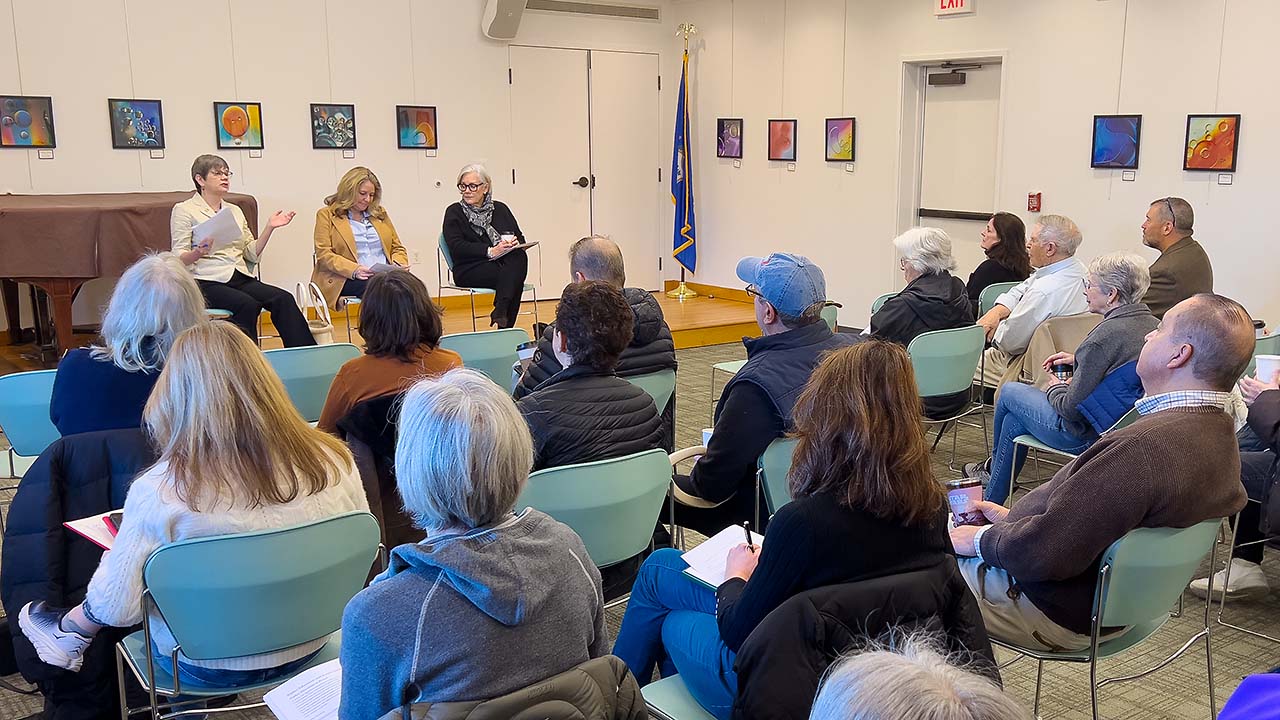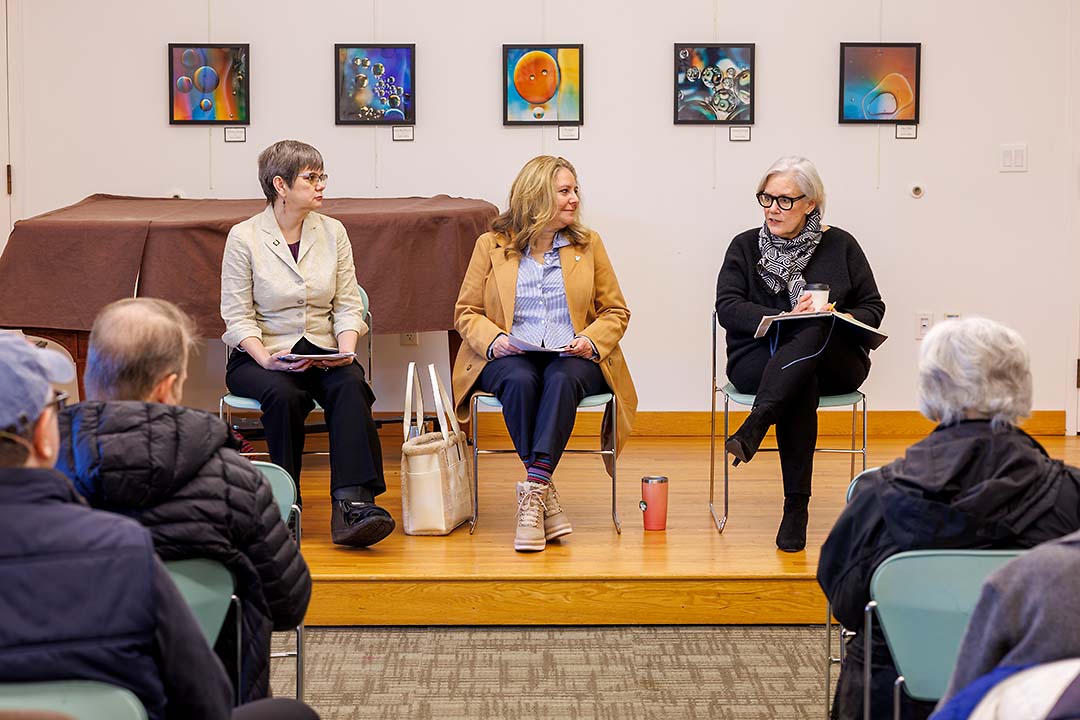Residents, Leaders Discuss State & Local Matters

Weston Today photos
Weston residents were briefed about state and local matters on the horizon and shared their views in a community conversation with State Senator Ceci Maher, State Rep. Anne Hughes, and First Selectwoman Samantha Nestor on February 3 at the Weston Public Library.
The 12-week “short session” of the Connecticut General Assembly opened this week. Despite the compressed time, Sen. Maher and Rep. Hughes both expect a number of major issues will be tackled.
The session is too short for some matters, but Sen. Maher said work continues on a strategic plan for children’s wellbeing that will rise in the 2025 legislature. She does expect action on “a significant bill” to ensure the safety of nurses, an issue brought into sharp focus in December by the murder of a visiting nurse at a Willimantic halfway house.
Also possibly on the agenda: regulations for AI deepfakes and nondisclosure agreements. Advocates are also pushing for an expansion of early childhood education, though the prospects may be limited by spending constraints.

Rep. Hughes, Ms. Nestor, Sen. Maher
Rep. Hughes hopes for action on a range of human services needs, including dealing with opioid abuse, elder abuse, financial scams that target older citizens, consumer safety, privacy protection, and “reproductive justice.” She said she is “determined to protect providers and patient privacy” and support mothers suffering postpartum depression.
Ms. Hughes also described the “unprecedented opportunity” of hundreds of millions of dollars potentially coming to Connecticut from the federal Inflation Reduction Act (IRA). Some of the money could be paid directly to towns for eligible renewable energy, resiliency, and infrastructure projects.
Help from Hartford
First Selectwoman Nestor said the legislators “can be instrumental” in helping Weston build infrastructure needed to fulfill the Plan of Conservation and Development’s vision of commercial development in the Village District. She said she “will be leaning on them heavily” for assistance with infrastructure, citing the maxed-out capacity of the septic system at the Town Hall campus, which led to the demise of the Weston Public Library expansion.
Ms. Nestor said the town will need help dealing with “the unfunded mandate for electric school buses by 2035.” Grants will be needed, she said, to study how to move the bus depot to make way for electric buses and charging. With ARPA funds running out, she said, the depot move “will be instrumental when we bond for school construction.”
A complication of infrastructure grants, said Ms. Nestor, is the common requirement that projects be “shovel ready” with full engineering and construction plans. She said the Town has a lean staff, cannot afford to “tax the community for plans for projects we may not get a grant for,” and hopes the state can provide seed money.
Rep. Hughes said the state’s Department of Energy and Environmental Protection has engaged a consultant who is “ready to help towns line up for IRA applications.”
Electric vehicles
Recent controversy about the state’s alleged intention to outlaw gasoline-powered cars by 2035 and force everyone to switch to EVs has been “caused by energy lobby misinformation,” said Ms. Hughes.
Sen. Maher said legislation adopted as early as 2004 requires the state to either follow California emission standards or those of the EPA, which were greatly relaxed in the previous federal administration.
Measures currently being considered would allow the purchase and sale of used gas-powered cars in the state after 2035, but not new ones. (An insistent buyer would have to purchase out of state.) The key is that all new vehicles sold in the state, whether electric, hybrid, hydrogen, or other-powered would have to meet strict emission standards.
Sen. Maher said the auto industry knows all this is coming, and already plans to stop making gasoline-powered cars by 2035. “We want to tell the industry we’re serious about emissions,” she said.
The senator added that Connecticut needs to set up charging infrastructure now, accommodate apartment dwellers, and upgrade the state’s energy generation and transmission systems.
“I think our hair should be on fire” about climate, said Sen. Maher. Rep. Hughes hopes that an omnibus bill will create a roadmap for energy production and reducing dependence on fossil fuels. Sen. Maher added that an urgent need exists to reduce methane emissions and that programs like community composting of food waste are helpful.
“In 2004,” said Ms. Hughes, “we were a leader in having a climate roadmap. Now we are behind.”
Affordable housing
Rep. Hughes said any legislation about affordable housing that emerges from the short session “will be modest,” primarily focusing on protection for renters. A report outlining approaches to the larger problem is due from the Office of Policy and Management at the end of this year.
Sen. Maher said the state needs 130,000 units for those with low income, workers, and senior citizens. Rep. Hughes said the state’s homelessness crisis includes a lack of emergency housing. Sen. Maher noted that Governor Lamont has brought together all relevant agencies to create a comprehensive plan.
Input from the community
Among the questions posed and viewpoints shared by members of the public were concerns about electricity. One resident urged others to switch from receiving power from Eversource to a third party supplier, where rates may be significantly lower.
He also said it may no longer be true that those receiving assistance for energy bills cannot use a third party, suggested checking, and urged the legislators to advocate for giving more power to the Public Utilities Regulatory Authority (PURA).
Information about obtaining a home energy assessment, available rebates and incentives, and rates charged by third-party supplies can be found on energizect.com.
The First Selectwoman was urged to have fog line stripes painted on the sides of Weston roads and reflectors placed on guide rails. Sen. Maher and Rep. Hughes heard a call for finding a way to provide public transit to Bradley Airport and a question about the cost of the state’s free meal program in qualifying schools.
The program was first established during the Covid-19 crisis. It was extended into the current school year by allocating $16 million of the state’s federal ARPA grant. Rep. Hughes said nourishment “is an important part of the learning process.” Sen. Maher said it increases the readiness of hungry students to learn. “The long-term effect on children is worth the $16 million,” she said.
